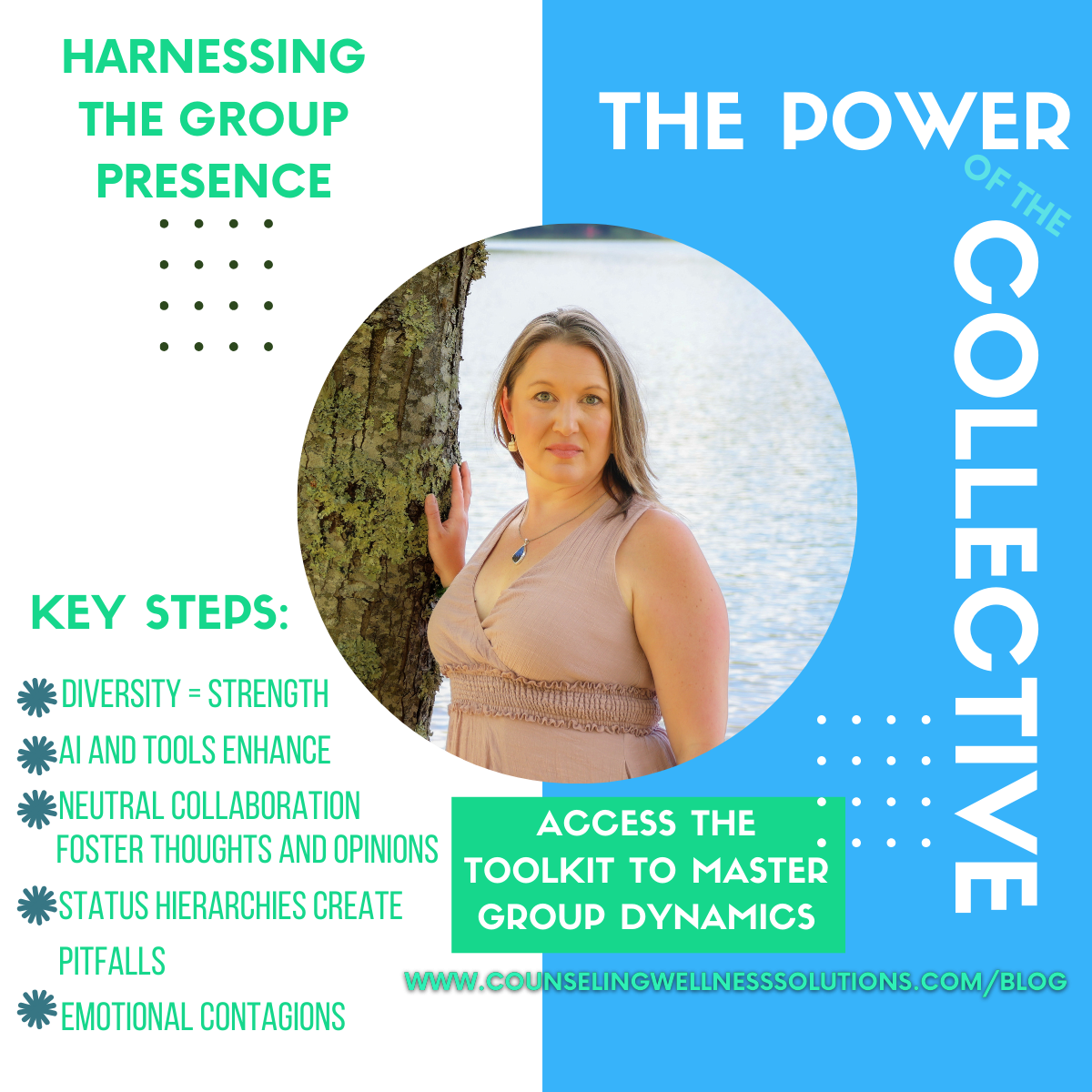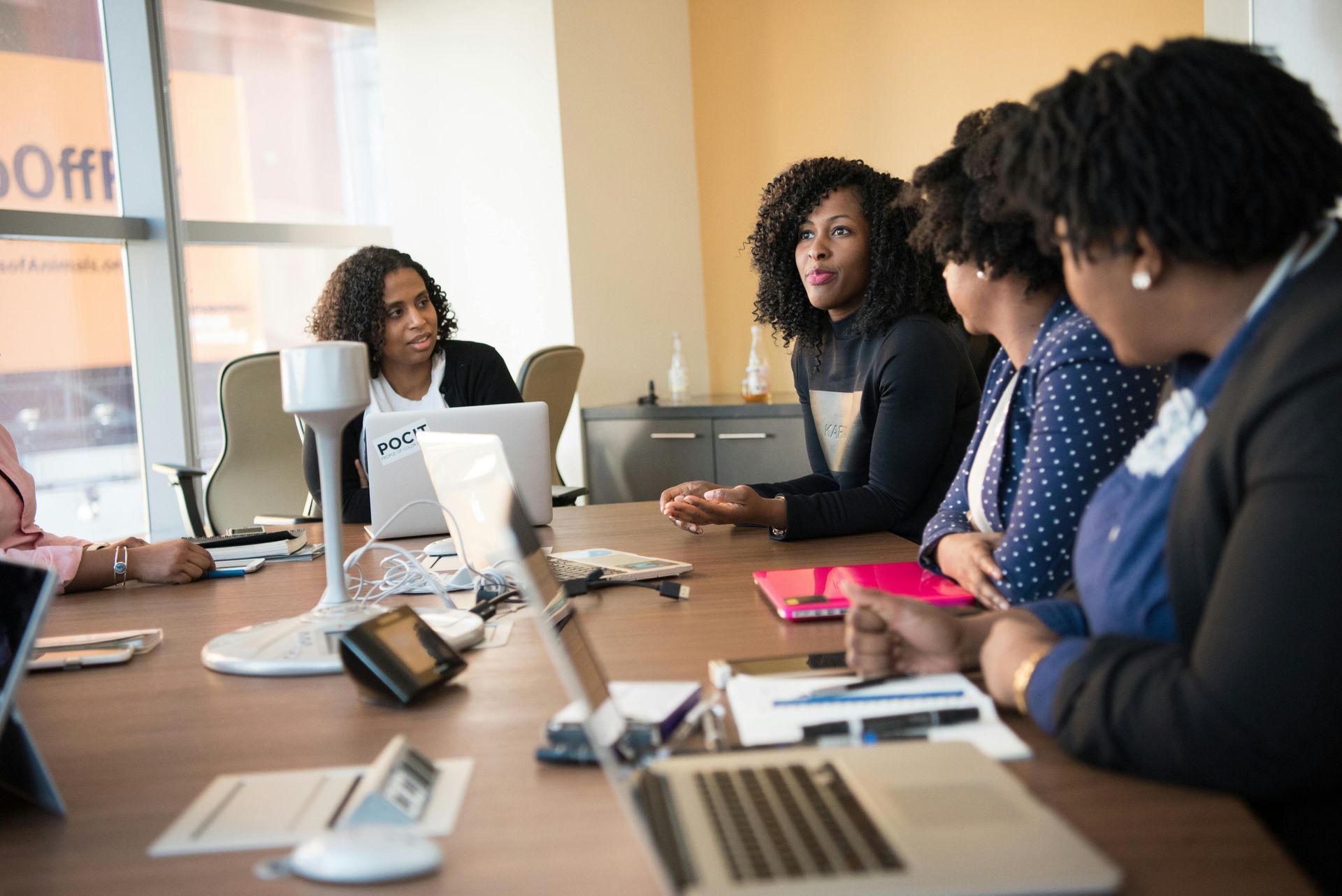Blog Layout
The Power Of Shared Wisdom
Jennifer Evans • March 26, 2025
Unlocking Collective Intelligence

Unlocking Collective Intelligence: The Power of Shared Wisdom
In an era of rapid innovation and interconnectedness, success is no longer just about individual intelligence—it’s about how well we collaborate, adapt, and leverage the collective wisdom of those around us. Collective intelligence emerges when groups of people pool their diverse perspectives, insights, and skills to create solutions that exceed what any one person could achieve alone. But for this intelligence to truly flourish, we must understand how to navigate group dynamics, overcome barriers, and foster psychological safety.
• Diverse perspectives fuel creativity – Different viewpoints challenge assumptions and open up new ways of thinking.
• Collaborative problem-solving leads to stronger solutions – Groups that debate ideas and refine them collectively tend to make more effective decisions.
• Distributed intelligence enhances decision-making – No single person has all the answers, but when knowledge is shared, the group’s intelligence expands exponentially.
• Observe patterns in engagement—Who speaks most? Who gets interrupted? Who is hesitant to contribute?
• Recognize emotional undercurrents—Tension, enthusiasm, and disengagement all shape group dynamics.
By tuning into these cues, leaders and team members alike can create environments that encourage participation and mitigate unproductive conflicts.
• Prepare in advance – Having key talking points can ease nervousness and help you feel more prepared.
• Shift focus from perfection to contribution – Instead of aiming for the perfect statement, focus on adding value.
• Practice active listening – Engaging attentively with others can make it easier to jump into discussions naturally.
• Seek out allies – Identifying supportive colleagues can boost confidence and create a more welcoming space.
• Self-awareness – Recognize your own emotional triggers and biases to avoid reactive decision-making.
• Empathy – Understand and validate the emotions of others to build stronger relationships.
• Conflict resolution skills – Address disagreements constructively rather than allowing them to disrupt progress.
• Adaptability – Be open to new perspectives and willing to pivot when necessary.
Teams that prioritize emotional intelligence experience greater trust, cooperation, and innovation.
A truly intelligent group is not just about having brilliant minds—it’s about ensuring that every voice is heard and valued. Psychological safety is the foundation of collective intelligence because it allows individuals to share ideas without fear of ridicule or punishment.
• Encourage curiosity
– Create an environment where asking questions is celebrated rather than discouraged.
• Normalize failure as part of learning – Reframe mistakes as opportunities for growth rather than reasons for blame.
• Lead with inclusivity – Actively invite input from all members, especially those who may be hesitant to speak up.
When individuals feel safe to contribute, teams unlock their full creative potential, leading to higher engagement, better decision-making, and increased innovation.
The Emergence of Collective Wisdom
At its core, collective intelligence is about synergy—the idea that the whole is greater than the sum of its parts. When individuals from varied backgrounds come together, they bring unique experiences, knowledge, and viewpoints that, when integrated, lead to innovative solutions and deeper understanding.
How collective wisdom emerges:
• Diverse perspectives fuel creativity – Different viewpoints challenge assumptions and open up new ways of thinking.
• Collaborative problem-solving leads to stronger solutions – Groups that debate ideas and refine them collectively tend to make more effective decisions.
• Distributed intelligence enhances decision-making – No single person has all the answers, but when knowledge is shared, the group’s intelligence expands exponentially.
Reading Social Cues and Unspoken Group Dynamics
One of the most overlooked aspects of collective intelligence is the ability to read and respond to social cues. In any group setting, a significant amount of communication happens nonverbally—through body language, tone of voice, and unspoken agreements.
Key strategies to enhance social awareness in groups:
• Recognize emotional undercurrents—Tension, enthusiasm, and disengagement all shape group dynamics.
• Pay attention to micro-expressions—Subtle facial expressions reveal unspoken reactions and concerns.
Overcoming Social Anxiety to Contribute Effectively
Many individuals struggle to voice their opinions in group settings due to fear of judgment, self-doubt, or anxiety. However, recognizing that your perspective is a valuable piece of the collective puzzle is essential for both personal and group success.
Ways to build confidence in group discussions:
• Shift focus from perfection to contribution – Instead of aiming for the perfect statement, focus on adding value.
• Practice active listening – Engaging attentively with others can make it easier to jump into discussions naturally.
• Seek out allies – Identifying supportive colleagues can boost confidence and create a more welcoming space.
Leveraging Emotional Intelligence for Better Collaboration
Emotional intelligence (EQ) is a fundamental component of collective intelligence. It allows individuals to navigate interpersonal relationships, manage emotions effectively, and foster meaningful connections within a team.
How to apply EQ to enhance group collaboration:
• Self-awareness – Recognize your own emotional triggers and biases to avoid reactive decision-making.
• Empathy – Understand and validate the emotions of others to build stronger relationships.
• Conflict resolution skills – Address disagreements constructively rather than allowing them to disrupt progress.
• Adaptability – Be open to new perspectives and willing to pivot when necessary.
Teams that prioritize emotional intelligence experience greater trust, cooperation, and innovation.
Creating Psychologically Safe Environments
A truly intelligent group is not just about having brilliant minds—it’s about ensuring that every voice is heard and valued. Psychological safety is the foundation of collective intelligence because it allows individuals to share ideas without fear of ridicule or punishment.
How to foster psychological safety in teams:
• Normalize failure as part of learning – Reframe mistakes as opportunities for growth rather than reasons for blame.
• Lead with inclusivity – Actively invite input from all members, especially those who may be hesitant to speak up.
• Establish clear communication norms
– Set expectations for respectful discussions and active listening.
Harnessing Collective Intelligence for Growth
Collective intelligence is the key to thriving in a world that demands adaptability, collaboration, and innovation. By valuing diverse perspectives, mastering social dynamics, overcoming self-doubt, leveraging emotional intelligence, and creating psychologically safe environments, we unlock the full potential of groups to achieve extraordinary results.
The future belongs to those who not only think deeply but also connect meaningfully. How will you contribute to the intelligence of the collective? Hit up our socials to join the conversation. #empoweringwellness
Want to learn how to maximize on your leadership style? Schedule an Initial Consultation.

By Jennifer Evans
•
April 1, 2025
The Illusion of Success: How Our Perspective Traps Us Success. We chase it, crave it, and measure our worth by it . But what if success—at least the way society defines it—is nothing more than an illusion? What if we’re running on a treadmill, believing we’re making progress, while actually going nowhere? The truth is, our perspective shapes our reality. And for many, that perspective is deeply flawed—trapped in comparison, external validation, and unhealthy cycles of suffering. Let’s break down these mental traps and uncover the real path to freedom. 1. The Comparison Trap "Comparison is the thief of joy." – Theodore Roosevelt Why You’re NEVER “Enough” No matter how much you achieve, it will never feel like enough if your success is measured against someone else’s. Why? Because there will always be someone with more—more money, a bigger house, a better body, a seemingly happier life. Society thrives on hierarchy and competition, convincing us that our value is defined by how we rank against others. This is a losing game—because someone will always be ahead. The Psychological Warfare of Social Media Social media isn’t just a highlight reel—it’s a distorted reality. • We compare our behind-the-scenes struggles to someone else’s curated perfection. • We assume people’s external success reflects their internal happiness (it often doesn’t). • We chase vanity metrics (likes, followers, comments) as if they define self-worth. How Constant Comparison Destroys Inner Peace Comparison fuels: ✅ Anxiety ✅ Low self-esteem ✅ A sense of never being “good enough” 📌 Fix: Shift from Comparison to Creation • Unfollow triggers. If certain content makes you feel inadequate, mute or remove it. • Celebrate your progress. Focus on your own growth rather than others' achievements. • Cultivate gratitude. Appreciate what you have rather than obsessing over what you lack. Success isn’t about beating others—it’s about becoming the best version of yourself. 2. External Validation Bondage "You can never get enough of what you don’t really need." – Dr. Gabor Maté The Illusion of Worth Through Possessions Luxury cars, designer clothes, dream vacations—they all look like success. But does owning them mean you feel successful? Modern society tricks us into believing that external wealth = internal worth. Yet, people who "have it all" often battle insecurity, emptiness, and the constant need for more. Why That New Car WON’T Fill Your Internal Void Material success can offer temporary highs, but those highs always fade. • A new car becomes just another car. • A big house eventually feels normal. • A promotion doesn’t remove self-doubt. This is called the Hedonic Adaptation Trap—the more we achieve, the less it satisfies us. Breaking Free from Performative Success Real success isn’t about what people see—it’s about how you feel. 📌 Fix: Redefine Success on Your Terms • Detach worth from possessions. Your value isn’t measured in things. • Ask: "Would I still want this if no one could see it?" If not, it’s likely about external validation. • Seek meaning, not just milestones. Focus on personal fulfillment, growth, and impact. Freedom comes when you stop trying to prove your worth and start living it. 3. The Suffering Spiral When success feels out of reach, we often fall into toxic coping mechanisms that keep us stuck. The Justification Cycle • "I just need to work harder, and THEN I’ll be happy." • "Once I hit this goal, life will feel better." • "I can’t rest yet—I haven’t 'earned' it." This thinking convinces us that suffering now will lead to happiness later. But later never comes. Avoidance Mechanisms When we fear failure, we: • Overwork (hustle culture burnout). • Distract ourselves (endless scrolling, binge-watching). • Self-sabotage (procrastination, perfectionism). Instead of addressing the root problem, we numb ourselves—delaying true change. Dismissive Protection Strategies • "Success is for lucky people." (Self-pity) • "I’m fine as I am." (Fear of failure disguised as contentment) • "I don’t care about success." (Defense mechanism against disappointment) These mindsets protect us from discomfort—but they also trap us in mediocrity. 📌 Fix: Break the Cycle with Radical Ownership • Happiness isn’t “out there”—it’s in how you live daily. • You don’t have to suffer to succeed. Prioritize balance and well-being. • Address emotions instead of numbing them. Growth happens through self-awareness, not avoidance. Find out more about what perspective is holding you back from a happier and healthier self, book a Free 15-minute Wellness Insight Call. Learn from our experts the cycles you are getting into. Book now! Check out the Perception Audit Workbook and Expectation Checklist to build more insight into your patterns of despair.

By Jennifer Evans
•
March 30, 2025
Ever feel like you're stuck in the same negative patterns, no matter how hard you try to break free? Destructive feedback loops are self-reinforcing cycles that keep us trapped in anxiety, self-sabotage, unhealthy relationships, and emotional burnout. The key to escaping these loops is recognizing them—once you see the pattern, you can disrupt it.Let’s dive into five of the most common destructive feedback loops and explore how to break free. Loop #1: The Anxiety Amplification Cycle How It Works: Anxiety breeds more anxiety. You feel uncertain about something → You start overthinking → Overthinking creates more doubt → Doubt fuels avoidance or frantic action → The cycle repeats, making you feel even more out of control. Signs You're Stuck in This Loop: • Constant overanalyzing and second-guessing. • Physical symptoms of stress (racing heart, restlessness, insomnia). • Feeling paralyzed by decision-making. How to Break It: • Practice mindfulness – Observe your thoughts without getting sucked into them. • Reframe uncertainty – Instead of fearing the unknown, embrace it as part of growth. • Take small actions – Progress, not perfection, is the goal. Loop #2: Self-Sabotage through Perfectionism How It Works: Perfectionism convinces you that nothing is ever good enough. You set impossible standards → You work tirelessly to meet them → Fear of failure builds → You procrastinate or overwork → When results don’t match expectations, you feel unworthy → Repeat. Signs You're Stuck in This Loop: • Struggling to start or finish projects due to fear of imperfection. • Harsh self-criticism and feelings of inadequacy. • Feeling exhausted but never satisfied with achievements. How to Break It: • Redefine success – Focus on progress rather than perfection. • Set realistic goals – Break big tasks into smaller, achievable steps. • Challenge inner criticism – Treat yourself with the same kindness you’d give a friend. Loop #3: Trauma-Driven Relationship Patterns How It Works: Unresolved past wounds shape how we connect with others. You experience past emotional pain → Fear and insecurity develop → You react defensively in relationships (push people away or cling too tightly) → This reinforces unhealthy dynamics → Cycle repeats, keeping you stuck in the same toxic patterns. Signs You're Stuck in This Loop: • Attracting emotionally unavailable or toxic partners. • Reacting intensely to perceived rejection or abandonment. • Struggling with trust, intimacy, or emotional regulation. How to Break It: • Identify your triggers – Understand how past experiences influence present reactions. • Develop self-awareness – Therapy, journaling, or mindfulness can help you unpack patterns. • Practice healthy communication – Learn to express needs without fear or avoidance. Loop #4: The Expectation Trap How It Works: Expectations shape our emotions. You expect things to go a certain way → Reality doesn’t align → Disappointment, frustration, or resentment builds → You either blame yourself or others → The cycle continues, leaving you perpetually dissatisfied. Signs You're Stuck in This Loop: • Feeling let down by people or situations often. • Struggling with rigid thinking (“It should be this way!”). • Difficulty appreciating the present moment. How to Break It: • Shift from expectations to adaptability – Life rarely follows a script; embrace flexibility. • Practice gratitude – Focus on what’s working instead of what’s missing. • Communicate needs clearly – Don’t assume people know what you want; express it. Loop #5: Emotional Burnout and Shutdown How It Works: Stress and emotional exhaustion build over time. You take on too much → You push through fatigue → Emotional reserves deplete → You start withdrawing or numbing out → Productivity and relationships suffer → More stress builds → Burnout deepens. Signs You're Stuck in This Loop: • Feeling emotionally numb, detached, or constantly exhausted. • Losing motivation for things you once enjoyed. • Frequent irritability, frustration, or unexplained sadness. How to Break It: • Set boundaries – Learn to say no without guilt. • Prioritize rest and recovery – Sleep, self-care, and time away from stress are essential. • Reconnect with joy – Do things that nourish your mind and soul, even in small ways. Breaking the Loops and Reclaiming Control Recognizing these destructive feedback loops is the first step toward change. Instead of being a prisoner to these cycles, you can disrupt them by making intentional shifts in thinking and behavior. Small, consistent changes lead to powerful transformations. Want more insight? Schedule a FREE 15 Minute Wellness Insight To Learn what your cycle is and how to break free . Which of these feedback loops do you relate to the most? Let’s talk about ways to break free! Get on our socials and use #breakingfree #empoweringwellness

By Jennifer Evans
•
March 30, 2025
Interviewing is stressful and can feel like our value is out on display. This time of stress creates pulls for our survival causing reactionary tendencies in the negative dynamic. Let's explore how this stress is causing us detrimental mistakes that is preventing the final offer letter. 1. Failing to Demonstrate Clear Value Proposition Many candidates make the critical error of simply listing their qualifications without connecting them directly to the company's specific needs. Instead of a generic recitation of skills, successful job seekers: Meticulously research the company's current challenges Prepare specific examples of how their unique skill set can solve those exact problems Frame their experience as a targeted solution, not just a list of past responsibilities Use concrete metrics and results to illustrate their potential impact 2. Weak or Absent Follow-Up Strategy The interview doesn't end when you walk out the door. Top candidates sabotage their chances by: Neglecting to send a personalized thank-you email within 24 hours Failing to reference specific conversation points from the interview Not demonstrating continued enthusiasm and fit for the role Forgetting to provide additional supporting materials that reinforce their candidacy Effective follow-up is a strategic communication that keeps you top of mind and shows professionalism, attention to detail, and genuine interest . 3. Lack of Authentic Enthusiasm and Cultural Alignment Modern employers aren't just hiring skills—they're seeking passionate team members who naturally fit the organizational culture. Candidates often lose opportunities by: Appearing mechanically prepared without genuine engagement Failing to show authentic excitement about the company's mission Not connecting their personal career goals with the organization's vision Presenting a one-dimensional professional persona that lacks personality The most successful candidates demonstrate how their professional aspirations genuinely intersect with the company's trajectory. 4. Poor Handling of Salary and Negotiation Discussions Compensation conversations can make or break an interview. Common mistakes include: Being unprepared with market-rate research Displaying nervousness or desperation during salary discussions Naming a specific number too early without understanding the full compensation package Failing to negotiate beyond base salary (considering benefits, flexibility, growth opportunities) Strategic candidates approach compensation as a collaborative discussion, not a confrontational transaction. 5. Inadequate Closing Communication and Future-Oriented Positioning Many candidates miss crucial moments to solidify their candidacy by: Not asking direct, thoughtful questions about next steps Failing to express clear, genuine interest in moving forward Not addressing potential concerns proactively during the interview Leaving the conversation without a clear understanding of the hiring timeline The most effective candidates treat the interview's conclusion as an opportunity to reinforce their fit, express enthusiasm, and subtly demonstrate their eagerness to contribute. Bonus Insight: Psychological Preparedness Beyond these tactical mistakes, many candidates struggle with the underlying psychological aspects of interviewing. Confidence, without arrogance, and genuine self-awareness are rarely discussed but critically important elements of interview success. Schedule a FREE 15 minute insight to learn how Empowering Wellness Can Get You On Top Of The Job Search Game!

By Jennifer Evans
•
March 24, 2025
For years, society has operated under the assumption that there is a "normal" way of thinking, often referred to as being "neurotypical." This idea has shaped education, workplace structures, and even social interactions. However, emerging research in neuroscience, psychology, and organizational behavior suggests that the concept of neurotypical is outdated. Instead, we are entering an era where diverse cognitive styles are recognized as essential to collective intelligence. What is Collective Intelligence? Collective intelligence refers to the shared intelligence that emerges from the collaboration and diversity of individuals within a group. It is the idea that many minds working together can produce insights, solutions, and creativity that surpass what any one individual could achieve alone. This concept is increasingly important in today’s complex world, where innovation and problem-solving require input from people with different perspectives, cognitive styles, and lived experiences. The Shift Away from Neurotypical Thinking The traditional model of intelligence has been shaped by the belief that there is a standard, optimal way to think and process information. However, as research into neurodiversity has expanded, we now recognize that cognitive differences—such as those associated with ADHD, autism, dyslexia, and other neurological variations—are not deficits but valuable contributors to problem-solving and creativity. Instead of striving for conformity to a single "right" way of thinking, businesses, education systems, and leadership models are embracing cognitive diversity as a strength. The Power of Neurodiversity in Collective Intelligence 1. Diverse Perspectives Create Stronger Solutions o When groups include individuals with different cognitive styles, they approach problems in nonlinear and innovative ways. o A mix of logical, intuitive, analytical, and creative thinkers leads to better decision-making and problem-solving. 2. Innovation Thrives on Different Thinking Styles o Some people excel at big-picture thinking, while others focus on details and execution. o Neurodivergent individuals often bring unique problem-solving abilities, creativity, and pattern recognition that would otherwise be overlooked. 3. Empathy and Adaptability Become Core Skills o When we recognize that every brain works differently, workplaces and teams develop greater empathy and flexibility in communication and collaboration. o This shift fosters psychological safety, allowing people to contribute their best ideas without fear of judgment. How Organizations and Leaders Can Harness Collective Intelligence • Encourage Inclusive Collaboration: Design teams with cognitive diversity in mind, valuing a range of processing styles and perspectives. • Rethink Communication and Workflows: Adjust communication styles to be more inclusive, utilizing multiple formats (visual, verbal, written) to accommodate different thinkers. • Challenge the Notion of "Normal": Rather than expecting people to conform to outdated productivity standards, embrace flexible approaches to work that allow individuals to thrive in their own ways. Conclusion: A Future Without "Neurotypical" The idea of a single "normal" way of thinking is an illusion. Human intelligence has always been diverse, and acknowledging this fact is the key to unlocking the full potential of collective intelligence. As we move forward, we must create spaces—whether in business, education, or leadership—where every cognitive style is not only accepted but valued. By embracing the diversity of the mind, we move toward a future where innovation, collaboration, and success are driven by the power of many, not the limitations of one. CALL TO ACTION: How do you see neurodiversity shaping the future of work and leadership? Let’s continue the conversation! Mention #empoweringwellness on my socials!

By Jennifer Evans
•
March 24, 2025
Boundaries are essential for maintaining self-respect, personal energy, and emotional well-being. However, many people struggle with setting firm boundaries, leading to people-pleasing behaviors, burnout, and a loss of self-worth. This quiz will help you determine how porous your boundaries are and identify steps to reclaim your value without guilt. Archetypes of Boundaries & Value 1. The Open Gatekeeper (Porous Boundaries) Key Features: Over-accommodating, avoids conflict, prioritizes others’ comfort over their own needs. People-Pleasing Traits: Struggles to say no, overextends themselves, feels responsible for others’ happiness. Key Steps to Pivot : Practice saying no without over-explaining, recognize that setting boundaries isn’t selfish, and prioritize self-care. 2. The Guarded Fortress (Rigid Boundaries) Key Features: Overly protective, emotionally distant, avoids vulnerability. People-Pleasing Traits: Appears independent but may isolate themselves to avoid rejection. Key Steps to Pivot: Allow trusted relationships to develop, practice healthy vulnerability, and communicate needs with confidence. 3. The Shifting Sands (Unstable Boundaries) Key Features: Adapts boundaries depending on the situation or person, fears confrontation. People-Pleasing Traits : Struggles to maintain consistency, adjusts behavior to gain approval. Key Steps to Pivot: Identify non-negotiables, create a script for setting boundaries, and stick to personal values regardless of external pressure. 4. The Rooted Guardian (Healthy Boundaries) Key Features: Balances openness with self-protection, respects their own needs while honoring others’. People-Pleasing Traits: Less likely to be overly accommodating, values authenticity over approval. Key Steps to Maintain : Reinforce personal limits, communicate assertively, and check in regularly to ensure balance. KEY STEPS TO RECLAIMING YOUR VALUE Step 1: Identifying Where You Give Away Your Value • Write down situations where you struggle to set boundaries. • What emotions do you experience when trying to say no? Step 2: Rewriting Your Internal Narrative • What beliefs keep you from setting boundaries? (e.g., "If I say no, they won’t like me.") • Challenge those beliefs by writing a healthier alternative (e.g., "Saying no helps me protect my energy and build respect.") Step 3: Setting Boundary Scripts • "I appreciate your request, but I can’t commit to that right now." • "I understand your frustration, but I am not responsible for solving this issue for you." • "That doesn’t work for me. Let’s find a compromise." Step 4: Tracking Your Progress • Journal moments when you successfully set a boundary. • Reflect on how it made you feel and what you learned. Conclusion Your value is not determined by how much you give to others. By identifying your boundary style and taking steps to strengthen it, you reclaim control over your emotional well-being and relationships. You are worthy of respect, balance, and self-care! Want to explore more? Check out our workbook on building a framework to success: Key Steps To Live A Happier and Healthier Life Part 1 A Life Worth Living. It is jam-packed full of ways to maximize on your value and high stress moment that make us lose touch with it. We explore in the book financial wellness, work/life balance, working the org chart, health/wellness, stress management, decision making, while continuing to explore our values. Buy it today!

By Jennifer Evans
•
March 23, 2025
A dvocating for Your Own Care: Taking Charge of Your Therapeutic Journey Advocating for your own mental health care is an essential skill that empowers you to take an active role in your healing and growth. While therapists provide guidance and support, your voice, needs, and experiences should be at the center of your journey. Understanding the key principles of therapeutic practice and knowing how to assert your needs can help you maximize the benefits of therapy. Key Principles for Effective Therapeutic Practice 1. Collaboration Over Hierarchy Therapy should be a partnership between you and your therapist. A collaborative approach ensures that your goals, values, and preferences shape the direction of your care. 2. Informed Decision-Making You have the right to understand the therapeutic process, including different approaches, potential benefits, and possible alternatives. Ask questions and seek clarity about the methods being used in your sessions. 3. Personal Agency and Empowerment Effective therapy encourages self-discovery and personal agency. A good therapist helps you recognize your strengths and build the confidence to make informed choices about your well-being. 4. Safe and Respectful Environment A therapeutic space should be free from judgment and allow for open, honest communication. Psychological safety is crucial for discussing difficult emotions and experiences. 5. Boundaries and Ethical Standards Ethical therapists maintain professional boundaries and prioritize your well-being. If you ever feel uncomfortable or unsure about an aspect of therapy, it’s important to address your concerns. Questions to Advocate for Yourself in Therapy Understanding the Therapeutic Process What therapeutic approach do you use, and why do you think it’s the best fit for me? How do you measure progress in therapy? What can I expect from a typical session? Clarifying Your Needs and Goals How can we tailor therapy to align with my personal goals? What are some strategies I can use between sessions to reinforce what we discuss? Can we adjust our approach if I feel something isn’t working? Ensuring a Safe and Effective Relationship What should I do if I ever feel uncomfortable with something in our sessions? How do you handle feedback from clients? Can I take breaks or change therapists if I feel I need a different approach? Building Self-Advocacy Skills How can I learn to better express my needs and emotions in therapy and in my daily life? What are some ways I can track my progress and reflect on my growth? Are there resources or exercises I can use outside of therapy to deepen my self-awareness? Conclusion Your therapeutic journey is unique, and advocating for yourself ensures that you receive the care and support that truly meets your needs. By understanding your rights, asking informed questions, and actively participating in the process, you can create a therapy experience that fosters meaningful growth and healing. Remember: Your voice matters. Your well-being is worth prioritizing. Therapy should be a space where you feel heard, empowered, and supported.

By Jennifer Evans
•
March 19, 2025
Hidden Killers of Relationships Every relationship faces challenges, but some destructive patterns—often unnoticed—can quietly erode trust, connection, and intimacy over time. These hidden killers include poor communication, unmet emotional needs, avoidance of conflict, resentment, and unhealthy attachment dynamics. When left unaddressed, they create cycles of misunderstanding, disconnection, and emotional distance. The key to overcoming these barriers is awareness, intentionality, and proactive effort. By recognizing these patterns, developing healthy communication skills, and fostering emotional attunement, couples can strengthen their bond and create a more fulfilling, lasting connection. Our Building Lasting Love Bonds: The Power of Intention in Relationships workbook is designed to help you identify and break these hidden patterns, fostering a relationship built on trust, respect, and deep emotional connection. Click below to start building a love that lasts! Access Building Lasting Love Bonds Workbook

By Jennifer Evans
•
March 18, 2025
Achieving a Positive Flow State Flow is the state of being fully immersed in an activity, where time seems to fade, distractions disappear, and you feel energized, focused, and deeply engaged. It’s the sweet spot between challenge and skill—where you're pushing your limits just enough to stay motivated without feeling overwhelmed. Experiencing flow regularly can increase productivity, creativity, and overall happiness. Achieving flow requires clarity of purpose, mindful focus, and the ability to manage distractions. By aligning your goals with your strengths, setting clear intentions, and cultivating a mindset of presence, you can unlock this powerful state more often. The Pursuit of Happiness workbook explores how to tap into flow, build habits that support it, and create a life centered on joy, purpose, and fulfillment. Click below to start your journey toward a more engaged and meaningful life! Click To Access Our Pursuit Of Happiness Toolkit.

By Jennifer Evans
•
March 18, 2025
Triangulation in Relationships & How to Break Destructive Patterns Triangulation is a dysfunctional relationship dynamic where a third person is pulled into a conflict between two individuals to relieve tension or gain validation. This often creates confusion, manipulation, and instability, preventing direct communication and healthy conflict resolution. Common examples include a partner involving a friend or family member to mediate disagreements, a parent using a child to communicate with the other parent, or a coworker turning to a supervisor instead of addressing an issue directly. To break destructive triangulation patterns, it’s essential to build direct communication, set clear boundaries, and develop emotional awareness. Recognizing when triangulation is happening is the first step. From there, practicing open and honest dialogue, taking responsibility for personal emotions, and fostering healthy conflict resolution skills can help create stronger, more balanced relationships. This workbook will guide you through exercises and insights to identify, disrupt, and replace these harmful patterns with healthier interactions. Access The Breaking Destructive Patterns In Relationship Workbook

By Jennifer Evans
•
March 17, 2025
Syncing Yourself to Your Job Search A successful job search isn’t just about sending out applications—it’s about aligning your mindset, strategy, and actions with your goals. When you’re in sync with your job search, you create momentum, stay motivated, and attract opportunities that truly fit your skills and values. 3 Key Steps to Align Yourself with Your Job Search: Clarify Your Vision & Goals Define what success looks like for you. Consider your ideal role, work environment, and long-term career aspirations. A clear direction keeps you focused and prevents you from applying to jobs that don’t align with your values. Develop a Consistent Strategy Treat your job search like a job itself. Set daily or weekly goals, optimize your resume and LinkedIn profile, and tailor applications to each position. Networking and personal branding are also crucial components of a proactive strategy. Maintain a Resilient & Positive Mindset Rejections and delays are part of the process. Practice self-care, stay engaged in learning opportunities, and remind yourself that the right opportunity will come. A growth mindset helps you stay motivated and adaptable. By staying aligned with your job search, you increase your chances of finding a role that truly fits your strengths, values, and aspirations. Access our Maximize Your Job Search Toolkit

